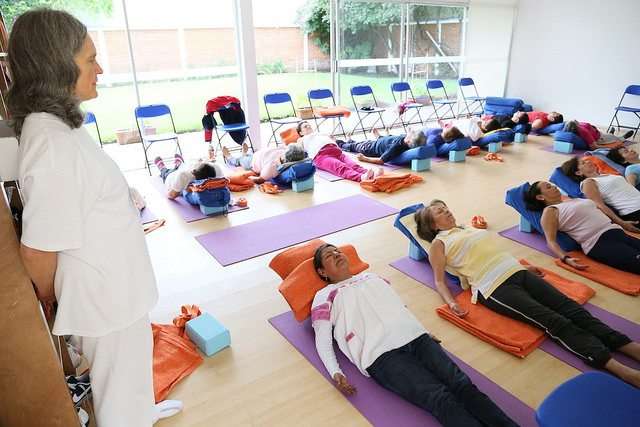Teens Won't Rest Until Vets Do: App Aims to Stop Night Terrors
A group of teenagers have designed a Bluetooth app to help veterans with PTSD get a good night sleep, without night terrors

Breast cancer is a disease that affects more than just the body—so, to help heal the mind and the spirit, a holistic approach is often an important complement to medicinal treatment.
In recent years, a growing number of organizations have begun to bring free yoga classes to patients in treatment—the practice has been proven to help improve both their mental and physical health as well as overall quality of life.
A study conducted by an M.D. Anderson Cancer Center back in 2006 followed 61 women receiving 6 weeks of radiation treatment for breast cancer. Half the women took a yoga class twice a week while the other half did not. Compared with the women who did not take yoga, the women in the yoga group reported having more energy and less daytime "sleepiness."
Other research has shown that yoga can help breast cancer patients reduce stress and fatigue levels, improve their sleep cycle, and help them learn better mind-body control.
A certification in yoga therapy requires hundreds of hours of specific training—Ellen Patrick, owner of the Breathe Easy Wellness Center in New York City, has over one thousand hours. Every Wednesday at 6:30, she teaches at Mount Sinai's Dubin Breast Center.
"On a physical level, it is very challenging to teach these women, as they are in varying stages of physical recovery and have had to undergo different forms of treatment," Patrick told Good News Network. "Some women are dealing with the effects of chemotherapy like nausea and fatigue, while others are finished and are hoping to rebuild strength, flexibility, range-of-motion and stamina."
Patrick conducts her classes through a partnership with Kula for Karma, a nonprofit group that brings yoga to cancer patients, adults with special needs, caregivers, veterans, domestic violence victims, at-risk youth, and veterans.
One of her former students still practices yoga back at home, and believes it will be part of her life forever.
"I was feeling so worried and concerned about my upcoming biopsy and tests, and then I started thinking that I should try and do some yoga poses that I learned in class," said the student, who wishes to remain anonymous. "I did the one when you bend the knees and you're rocking, also the one when you put the feet together and open the knees. I started to breathe deeply, and slowly, I finally fell asleep."
Kula for Karma was founded in New Jersey in 2007 by a woman named Geri Topfer, who wanted to bring yoga to underserved communities that might not otherwise have access to it. To date, the organization has launched 600 different programs on the East Coast.
Jody Winsick-Soluri of Hillsdale, New Jersey says that throughout the course of her treatment, these yoga classes have helped her get ready to face the hectic day ahead.
"The first class was overwhelming, because I didn't realize how much my physical strength deteriorated," she explained. "But now, the Monday classes help me kick-start my week physically, mentally, emotionally and spiritually. To have an hour of quiet uninterrupted time to shut off my brain rejuvenates me. If I miss a week, I definitely feel a difference in my strength, balance and state of mind."
Photos: Pan American Health Organization, Eli Christman CC
Share This Story With Your Friends:
Be the first to comment